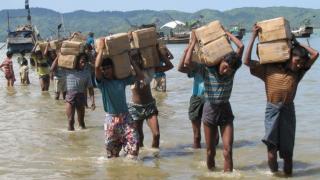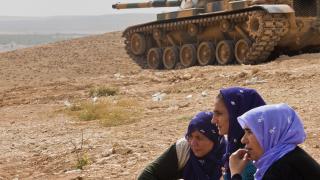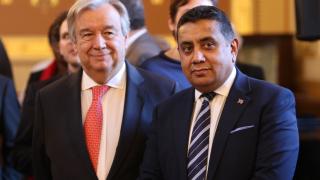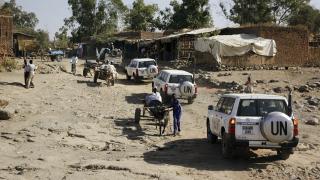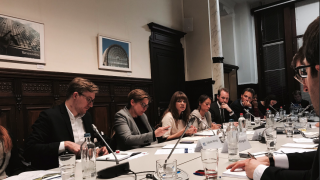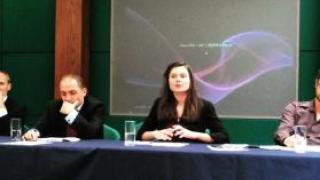
This speech was given during a conference marking 10 years since the Responsibility to Protect (R2P) was endorsed by all UN member states. It outlines UNA-UK's approach to R2P and the aims of our R2P programme.
UNA-UK's Peace and Security Programmes Officer, Alexandra Buskie, was joined on the panel by Mr Paul Bentall, Research Analyst at the Foreign and Commonwealth Office and Mr Mark Lattimer, Executive Director of Minority Rights Group International.
The conference was organised by scholars funded by the Economic and Social Research Council and took place on 23 June 2015 at the University of Westminster.
A practitioner's perspective of R2P at 10: domesticating the principle
My name is Alexandra Buskie and I am the Peace and Security Programmes Officer at the United Nations Association – UK. UNA-UK is a small charity and membership organisation that provides information and analysis on the UN. We work to set out why the UN is important to the UK and vice versa, and encourage the UK to have a progressive foreign policy that reflects the UN’s ideals and matches or exceeds best practice internationally.
Introduction to UNA-UK’s programme
As Peace and Security Programmes Officer, I have been responsible for managing our Responsibility to Protect programme for the past three years. The programme has a three pronged approach:
- Public outreach and advocacy with our members and supporters across the country, as well as coordinating work with NGO partners
- Parliamentary lobbying and outreach – providing information and briefings to parliamentarians about R2P and how it relates to their areas of interest
- Policy research and analysis, speaking to people from the Foreign Office about what they could be doing to support R2P and better put it into practice
I’ve been asked today to talk a little bit about how UNA-UK approaches R2P and why we think it is a useful principle.
The whole programme was established on the assumption that R2P is a useful principle and a good thing that the UK should be engaged with. As the UN Association is it hardly surprising that we support a universally agreed UN principle.
Of course, not everyone has this starting point. One of the main aims of the programme has been to raise awareness of R2P in all these different audiences and show the potential added value of it for UK policy.
Why is R2P useful?
- The principle is an elegant statement of national and international responsibilities. If we didn’t have this idea of sovereignty as responsibility by now, we would have had to come up with it
- It has been agreed by all member states at the UN – this gives the idea credence and legitimacy. You can hold all states to their commitment
- As Ed Luck has said in the past, R2P is “narrow but deep"; it focuses us on considering how to prevent specific crimes, but also asks us to consider how to do this in the most wide-ranging way possible – consider the stages of genocide and atrocities and think about entry points for national, regional and international actors
- The parts of R2P in practice that never get into the news – capacity building, training, human rights monitoring – are extremely worthy and the principle is getting us to move away from the repetitive “military or nothing” approach – just not in the public eye. It is creating cultural and institutional change at the UN level and national level to focus on prevention, but we need to be aware that this kind of change takes years to institutionalise.
Our approach
UNA-UK is a small charity with a small field of influence – I am the only one working on R2P and wouldn't dream of thinking I could change the policies of other states on the Security Council. We concentrate on the UK. We are interested in how the UK engages with the principle, how it supports the creation of a norm of atrocity prevention nationally so as to support the emergence of a norm internationally. In short, our programme is about taking R2P out of the discussions of the Security Council and into the practice of one of its member states.
We started by commissioning a study examining where R2P sits in UK policy by Professor Jason Ralph. He found that:
- Despite positive statements at the UN about R2P, the principle wasn’t really included in UK strategy for building stability overseas and conflict prevention. It is included in a Protection of Civilians Strategy, but this strategy has expired and there is no news as to whether this will be renewed. Plus, the Protection of Civilians is a concept that only applies during armed conflict, so the strategy blunts R2P to only consider how it applies during times of conflict, ignoring peacetime atrocities
- There is no particular 'atrocity prevention lens' applied to the UK’s stabilisation, development, diplomacy, defence, security, conflict prevention activities,
- nor were particular indicators of atrocity included in the UK’s early warning frameworks
- The UK has what is called an 'R2P focal point' – someone in Government who is meant to be responsible for promoting R2P within the system – but there is very little information about what this position does
- The UK Government’s stance on intervention is not in line with what was agreed in 2005, with the UK still claiming it would be legally permitted to intervene without the Security Council’s authorisation
In separate studies, we have also found that there is an almost complete ignorance of R2P and atrocity prevention as a policy theme in Parliament. Only one political party mentioned the term R2P in its manifesto.
So what does this all mean? Basically, UK policy doesn’t set out atrocity prevention as an explicit goal of its foreign policy, nor does it set out how it seeks to implement R2P. There is no atrocity prevention lens in UK policy and very little knowledge and understanding about what R2P is, how it has developed and how it could inform the UK’s approach to conflict prevention and human rights. In short, there is no real ambition with regards to R2P.
Why is this concerning?
At the international level, it is concerning for R2P as a principle that is aspiring to become a norm. By not walking the talk, the UK is not setting a good example. It doesn’t need to shout about it or bully others into doing things, but if it just established that the prevention of R2P crimes were a goal of its strategies, this would go some way in supporting the health of the principle internationally. For instance, the sole fact that the Obama Administration in the US has stated that atrocity prevention is a strategic national interest of the US is seen as extremely important normatively from the UN Secretariat’s perspective
At the national level, including atrocity prevention as a goal of policy could help to raise awareness and understanding of the phenomenon of atrocities and how the UK can work to prevent them, rather than just react to them as they happen.
I was recently in Washington DC to learn about the US experience of setting up the Atrocities Prevention Board. It was really interesting to hear about the positive ripple effects of setting a high-level political goal and giving people responsibility for overseeing it in their daily work – producing tool kits for development field workers, training for military officers, improved intelligence and early warning analysis and generally increasing awareness and understanding of atrocities across departments.There was a real proliferation of knowledge across all the different government departments about the phenomenon of atrocity crimes.
At an operational level, it feels like the UK is missing something; there is no atrocity prevention lens complementing existing policy. Atrocity prevention may be implicitly covered by programmes that seek to build stability or prevent conflict but it is difficult to tell. There are numerous studies that look at the distinctions between conflict prevention and atrocity prevention which suggest that policies aimed at one don’t necessary support the other.
- Atrocities are not an inevitable feature of conflict. You can continue to try and prevent atrocities even when your efforts to prevent conflict have failed
- A third of atrocities take place outside times of conflict. North Korea, Eritrea, the Rohingya in Burma, the Uzbeks in Kyrgyzstan
- Atrocities are crimes perpetrated against particular groups because of their identity. Does UK policy consider how the protagonists of these crimes should be treated? How do you deal with the perpetrators in a way that protects the potential victims?
- Conflict prevention seeks to avoid violence altogether. R2P recognises that you may sometimes need to use violence to stop atrocities from taking place
So, this is why our main policy work focuses on getting the UK to mention R2P or atrocity prevention in its strategies, into its early warning frameworks and into the consciousness of parliamentarians and Government officials.
The label of R2P
You’ll have noticed by now that I am interchanging between R2P and atrocity prevention – what is in a name?
In UK policy circles, as with many humanitarian NGOs, there is a tendency to shy away from using the term R2P. Some have gone as far as to say that R2P has become a 'toxic brand' after Libya. I use the terms interchangeably so as not to shut down conversations with people who believe this.
However, on a recent trip to the UN in New York, I saw no real evidence of this sentiment whatsoever. Member states at the UN – including BRICS countries – do not blame R2P for what has happened in Libya. They blame NATO. There is a clear distinction in the UN fora between R2P and the intervention. The annual reports and interactive dialogues show that member states are still willing to engage with and develop the principle and the Security Council continues to reference R2P in relevant resolutions (35 to date, 24 of which have been agreed post-Libya).
The Secretariat is also being extremely assertive in continuing to institutionalise R2P. The Office of the Special Adviser on the Prevention of Genocide and R2P is releasing more statements, organising more capacity-building and training and briefing the Security Council more and more. The Secretary-General’s Human Rights up Front initiative is symbolic of the desire in the Secretariat for the whole UN system to put R2P into practice, trying to change the entire culture of the UN to put human rights at the centre. They are pushing on with this even despite pushback from some member states on the human rights agenda.
I am working to combat this negative view of R2P head on and will challenge the UK to have more ambition and show more leadership in its approach to R2P. As an organisation that relies on grassroots membership and support, I sincerely hope that everyone in this room will help us demand more from the UK Government on this issue.


